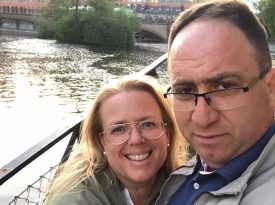By Dale Gavlak | Catholic News Service
NORRKÖPING, Sweden (CNS) — Baghdad native Fadi Jarwa and his Swedish-born wife, Caroline, chat in Arabic with passersby in a park. Some are Palestinian Christians visiting from Bethlehem, while others are Iraqi Muslims who have found a new home in this post-industrial town near Sweden’s east coast, about 100 miles southwest of Stockholm.
As they chat, the couple keep a watchful eye on their daughters, Norah and Sarah, playing with other children at a sculpture with rushing water from a nearby stream. Jarwa jokes that they have both “a daughter with straight, blond hair and another with soft, brunette curls,” reflecting their combined ethnic heritages.
Fadi Jarwa moved to Sweden in 2007 because of the U.S.-led invasion of Iraq that toppled dictator Saddam Hussein four years earlier and the sectarian violence and instability that has engulfed the country since.
“Each generation has suffered and has left their homes to make the next life somewhere else,” he explained of the Jarwa family’s fate as Arab Christians.
A trained automation engineer from the University of Technology in Baghdad, Jarwa worked for Siemens, a German industrial manufacturing company, there.
“My family has been based in Iraq. Although I was born in Baghdad, my father and mother were born in Mosul. But my grandfather was born in Mardin, Turkey,” he told Catholic News Service from his adopted home in Norrköping.

“During the First World War, Christians faced sectarian violence in the lands of the Ottoman Empire. Some family members lost their lives, others fled, and moved to other locations. My family moved to Iraq’s Ninevah Plains and Mosul, and eventually my parents went to Baghdad because of job opportunities,” he explained.
Although Jarwa’s family has been scattered as far afield as Canada, “the Jarwa family is famous in Aleppo, Syria,” the 46-year-old said.
That’s because of the family’s noted Catholic clergyman, Mikhail Jarwa, of several centuries ago. A Syriac Orthodox bishop of Aleppo, Metropolitan Mikhail was elected in 1782 as patriarch, the highest rank of bishops in Eastern Orthodoxy.
“But because of his way of belief, he started to think about conversion to Catholicism. God helped him surely,” said Jarwa.
Soon afterward, the patriarch declared himself a Catholic and took refuge in Lebanon, where he built the still existing monastery of Our Lady of Deliverance near Sharfeh. After Patriarch Jarwa, there has been an unbroken succession of Syriac Catholic patriarchs.
Once Fadi Jarwa moved to Sweden, he studied the language and committed himself to adapting to a new culture and way of life.
“To be here in Europe is a completely different system, a different society from the Middle East. You start from zero or minus sometimes. But you need to begin somehow and then (set) your goals — where you want to be and how to reach them,” he said of the journey to achieve his place in Swedish society. “It was tough, but we thank God for this opportunity.”
“Of course, I believe in God’s plans for me and my family. We pray, read the Bible, and always ask him to show us his wisdom, because making decisions is not always easy,” he said. “You need discernment.”
The issue of immigration took center stage in September during Sweden’s national election, which saw the Social Democrat Party, the dominant force in the country’s politics for most of the 20th century, knocked out of ruling power. Under the party’s governance, Sweden had one of the world’s most welcoming refugee policies.
Now, three center-right parties have formed a coalition government with support from the Sweden Democrats, a once radical far-right group that retains a hard line on immigration and can influence government policy from the sidelines, even without Cabinet seats. The Sweden Democrats have caused alarm among a number of Swedes because of the group’s neo-Nazi past.
“It’s a bit dangerous” when some politicians would use Christianity to justify certain policies that often counter church teaching, like on issues such as migration, Swedish Cardinal Anders Arborelius told Catholic News Service in Rome earlier this year.
The Christian community in Norrköping encompasses Swedes and Arab immigrants, providing a richness to the congregations and the culture of the town.
“In the East, we are used to having a close social life, which in some cases has been lost in the industrialized West with long work hours,” Jarwa explained. “However, getting together with this Arabic group provides the opportunity to meet people, hear other experiences and lends emotional support and a kind of energy and hope.”
“As parents, my wife and I are learning more how to integrate values from family and church. We are doing our best and hope it provides the right basis and support for our children in the future for the society we’re living in,” he said.






















